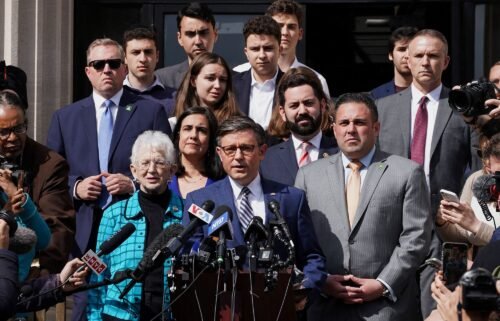Why it’s Joe Biden, Elizabeth Warren and then everybody else
First things first: The theme song of the week is the closing credits to Timon & Pumbaa.
Poll of the week: A new Fox News poll of Democratic primary voters nationwide finds that 32% want former Vice President Joe Biden to be the Democratic presidential nominee in 2020. Massachusetts Sen. Elizabeth Warren comes in at 22%. Vermont Sen. Bernie Sanders stands at 17%. No one else polls better than 5%.
An average of polls taken since the impeachment inquiry into President Donald Trump began have Biden at 29%, Warren at 25%, Sanders at 15% and no one else above 5%.
What’s the point: Right now, there’s little doubt that Biden and Warren are the top tier in the Democratic primary fight. With the exception of Sanders, no one is even close to Biden and Warren nationally. The question now is how likely are we to be looking at the potential nominee when focusing on the top three at this point.
A look back at history suggests there is a high likelihood that either Biden, Sanders or Warren will be the Democratic nominee.
There have been 16 primaries in the modern era in which an incumbent was not running in said primary. For those 16, I looked at the polling averages for each candidate who ultimately ran or was running in the second half of the year before the primary. These averages were calculated by FiveThirtyEight.
There have been a number of candidates not close to leading in the polls at this point who went on to win the nomination. A trailing candidate has gone on to win 7 of 16 times (44%). You may recall Barack Obama was trailing Hillary Clinton at this point in the 2008 Democratic primary. Of course, Obama was running second to Clinton.
When you look outside the top three polling candidates in past primaries, there really hasn’t been a lot of success. Only three times has a candidate not in the top three at this point won a nomination. Those were George McGovern in 1972, Jimmy Carter in 1976 and John Kerry in 2004.
Another way to look at this is to look at the percentage everyone was polling at. When the leader in the national polls in the second half of the year before the primary was at greater than 20% (12 times), there has been just one instance of someone polling below 15% going on to win the nomination: McGovern in 1972. And even he was polling at 6%, which is greater than all the Democrats outside of the top three at this point in the 2020 cycle.
We can formalize this analysis through a simple model looking at where candidates were polling and whether they won the nomination. When one candidate is polling at about 30% and another is polling at about 25% in contests with no incumbent running, together they have about 75% chance of winning the nomination. Add in a candidate polling at about 15%, the chance that one of the top three wins is about 85%.
Indeed, the average of our three statistical exercises suggest there’s about an 85% chance Biden, Warren or Sanders wins the nomination.
This means that the national polls indicate the chance that someone not named Biden, Sanders or Warren wins the nomination is about 15%.
Now, 15% isn’t nothing. It leaves open the possibility that one of the candidates at 5% or below may end up strongly challenging for the nomination. The fact that there are so many of them this year perhaps heightens the chance of a non-top three polling candidate wins this year. Perhaps, it will be someone like South Bend, Indiana, Mayor Pete Buttigieg, who is polling very close to the top three in Iowa.
Still, the most likely outcome is that the Democratic nominee will be Biden, Sanders or Warren, with Biden and Warren having particularly strong chances.



